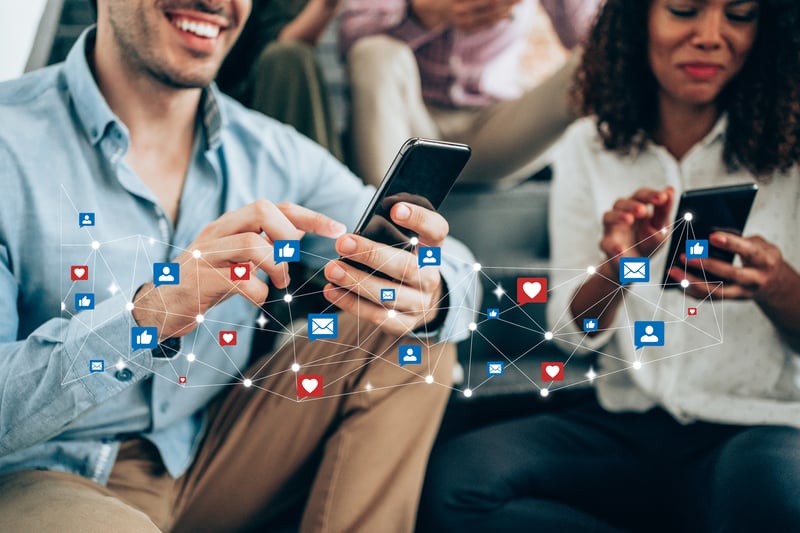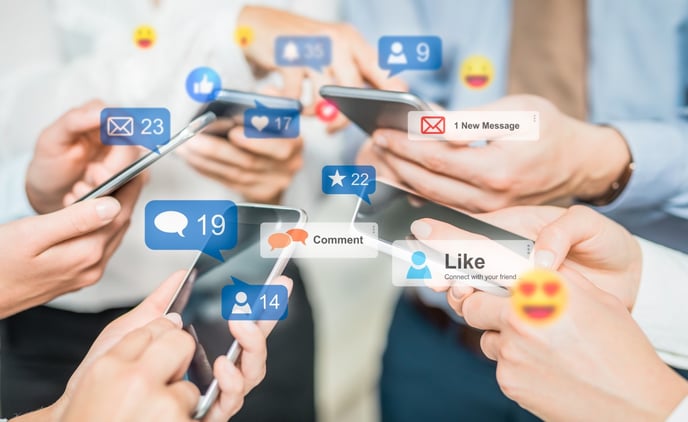
Think about how much time you spend scrolling on social media platforms—all of them. Don’t worry, we won’t judge; we just want to make a point. Even if it’s not you, someone you know spends a lot of time scrolling Facebook, Instagram, TikTok, Twitter, and LinkedIn or getting sucked into videos on YouTube. How do you know? Because they share the content with you and their friends. Whether they share it over social media, via a message, or simply show you their phone, one thing is certain: social media is an amazing tool with the power and potential to amplify the success of your corporate event.
In fact, social media is so fundamental to an event’s success, it should be included in every stage of your event from pre-planning all the way through to the post-event debrief. Event planners and hosts need to understand how to best leverage social media in each stage to help fuel an event’s success, and those strategies aren’t always the same as what works on your personal accounts.
Quick Links
Why Social Media Matters for Corporate Events
When we think about events and social media—separately and together—the very core of both is connection. It’s about people coming together to meet, share experiences or ideas, and grow relationships. Given social media’s ability to help us make connections, it’s a natural extension of an event, but there’s more to it than that.
Social media provides the opportunity for you, as the event host, to:
-
Raise awareness and build excitement about your event
-
Target focused audiences and reach a wider audience
-
Engage your audience and guests in conversations about the event
-
Connect guests or allow them to see attendees with whom they have established relationships
-
Increase and encourage posting about the event before, during, and after
-
Engage individuals who cannot currently attend but may be interested
-
Allow presenters to understand their audience and their interests before the event
-
Receive immediate feedback from attendees and guests about their event experiences
In short, social media has the potential to set you, your event, and your guests up for success.
What Social Media Platforms Should You Focus On?
Because social media is a tool you should be using to promote, energize, and celebrate your event, discovering which platforms to utilize is important. You don’t want to spend all your time focusing on one platform only to realize your audience is on another. Additionally, different stages of your event will lend themselves to different platforms. Learning how to use social media as a tool is a huge advantage in the events industry.
1. Instagram
There are over 1 billion Instagram users in 2021 with 90% of those users following a business. While the demographics around daily activity skew a bit younger, 30% of users over 55 are logging on at least once a day. That means you, your business, and your event have the opportunity to tap into a huge network of people. Plus, most Instagram users are using other social media platforms as well, which means they can share cross-platform!
However, Instagram is a social network of images, so you’ve got to be sure that what you’re sharing is visually appealing and will stand out as users scroll their feed. One downside is that if you fall shy of 10K followers, it’s not easy to create clickable links (you’ve got to work from your bio), but if you’ve got more than that, you can share a clickable link in a story.
Instagram is also a great way to share pictures during and after your event. Your creation of a catchy hashtag can create a buzz, making it easy for followers to see your spectacular event.
2. Facebook
As the world’s most popular social media platform with 2.7 billion monthly users, it seems unimaginable that a social media strategy wouldn’t include Facebook. Facebook can simplify everything from helping users spread the word; sharing promotional content; connecting attendees before, during, and after the event; facilitating registration; advertising your event; sharing pictures; and streaming live as your event is happening. In terms of social media tools, Facebook has it all.
In fact, with hashtags enabled on Facebook and cross-posting from your account allowed, you can leverage the power of these different social media platforms together.
3. Twitter
With 38 million daily active users in the first quarter of 2021, Twitter should be part of your game plan. Not only can you use hashtags, links, images, and more, but you can also connect guests to speakers, retweet VIPs or people who mention your event, and essentially use the network to build buzz for everything associated with your event. During your event, it’s a great way to add a live feed or even have individuals live-tweeting sessions, keynote speakers, and activities. Again, hashtags are your friend on this platform and are a great way to keep everyone connected.
4. TikTok
Jump on the TikTok bandwagon! Not only is this the latest social media trend, but it gives you the ability to create tons of fun content. Again, hashtags are a valuable tool on this platform, making it easy for your guests to follow posts related to your event.
With over 1 billion monthly active users, it’s a great way to connect with users of all demographics but particularly younger people as 60% of users are members of Gen Z. Further, users spend an average of just under an hour on the app daily, meaning you’ve got a great opportunity to capture your audience's attention through engaging content. Or you can encourage your guests and speakers to create their own! Nearly 83% of users have already made their own videos.
5. Snapchat
While it’s not as ubiquitous as it once was, Snapchat is still in the game with nearly 265 million daily users and growing. Users spend nearly half an hour on the platform and check it sometimes up to 30 times a day! While users tend to be younger, the CEO boasts that the app reaches 75% of people ages 13-34. If you want to attract a younger crowd and keep them engaged with your business or product, leaving out Snapchat is a misstep.
Similar to TikTok, Snapchat is a video-focused app that provides the opportunity for you to demonstrate the tone and energy you hope to create for your event. It’s a great way to draw your audience in and allow them to share content.
6. LinkedIn
We wouldn’t want to leave out social media’s more mature older sibling. LinkedIn is a great way to connect with an older demographic. Depending on the type of event you’re planning, this may be a successful avenue if you’re including educational content or professional development opportunities at your event. Similarly, if there’s a networking element or industry focus, then LinkedIn should be included in your strategy.
With over 900 million users worldwide and 30+ million companies utilizing the platform, it’s an effective route if your event is one you want business professionals to discover. More specifically, it’s a useful way to share articles, highlight speakers and workshops, or discuss the type of industry knowledge and expertise that may be shared at your event.
7. Pinterest
The key to using this social media platform is knowing your demographic. Pinterest is nearly all visual and of its 478 million monthly active users a whopping 77% are female and more than 60% are over the age of 30. Further, 50% of the users live outside of the U.S., and nearly 80% of mothers use Pinterest. In short, understanding who your audience is will be key to leveraging this network.
These are the key social media networks to tap into. It’s crucial that you not only understand the demographics of your intended audience, but you also match that demographic to the appropriate platform and gear your content to that medium as well. Great video content is only great if it is seen and shared, so choosing the right content, tone, and platform should be part of your strategy.

What Are Social Media Strategies for Events?
Now that we have a list of social media platforms, how do you develop a social media strategy? Your strategy is your guide to using social media before, during, and after your corporate event, so there are several things you’ll need to consider.
1. Social media platforms - You’ll want to determine which platforms you need to be on. The platform(s) you choose should be based on your audience demographics and the type of event you’re hosting. Even if you love Facebook, if that’s not where your audience is, your strategy must always align with their preferences—not yours.
2. Determine your goals - What is your goal with social media posts? Before the event, you probably want to generate buzz and encourage more people to register. In order to do so, ensure that your posts make it easy to sign up.
During the event, you’ll want to keep guests engaged and keep people talking, so it’s the perfect time to start posting photos or short videos
After the event, you’ll want to share the memories made. Start building FOMO (fear of missing out) among those who didn’t attend to encourage them to register next time, and connect attendees to resources (and each other) while asking for feedback. Also, make sure everyone is connected to your social accounts in order to keep them in the loop for your next event.
3. Hashtags - Have we mentioned hashtags yet? They’re key. That’s how you, your guests, and others interested in your event are going to find all the best social media content about your event. The best hashtags keep it simple. They’re short, catchy, relevant to your event, and easy to understand. Use them everywhere: in bios, advertisements, promotional materials, posts, and anywhere you mention the event. Encourage your guests and others connected to the event to use it as well.
4. What to post - Part of your strategy, based on your goals, will be deciding what type of content to post. Some of that will be determined by the platform and some by your audience, but no matter what, make it visual. 80% of social media users are reading only the headline, but an image increases the chance they’ll read something by 80%. So even if you’re posting an article or a link to a speaker’s page, be sure to include an image.
Feel free to experiment here as well. Remember, what works on one platform may not have the same impact on another. That has to do with the audience as well as the way users experience different social media feeds.
Don’t forget to use your hashtag!
5. Use the tools and resources - Even if (especially if) social media isn’t your strong suit, there are plenty of resources and tools available to help.
Posting/scheduling tools - These applications help streamline and schedule your social media posts, saving you time and effort by letting you set up your post and platforms all in one place. These include tools like HootSuite and Buffer.
Influencers and participants - If your social media following is a bit lackluster, then you can always reach out to your event partners, such as speakers, venues, entertainment, and others to help share your event and content.
You can also utilize social media influencers who typically have large followings. Choose one who has a connection to your event, and then offer up free tickets, swag, or something else of value to have them share your content with their followers.
Paid ads - Due to algorithms on social media platforms, it’s possible that only a fraction of your followers will see information about your event. However, paid advertising on social media platforms can ensure that more people see your content. If you set aside part of your event budget, you can easily include this in your strategy.
In the pre-planning stage, establishing your social media strategy is key to having that strategy work for you, your event, and your guests.
How to Leverage Social Media at Your Corporate Event
So now that you have a strategy, let's discuss what that looks like when put into action. Here are a few tips on how to integrate social media before, during, and after your event to help draw attendees in, drive more engagement, answer questions, and ultimately make your next corporate event more successful.
Social Media Before Your Event
Prior to the event, your primary goal on social media is to generate excitement and registrations. You can engage with both potential attendees and those who have already registered through social media channels.
Build anticipation for your event even before you have your mobile app up and running. Getting attendees excited is important because they can then get others excited by word of mouth. It’s also important to be informative—tell them what they can expect, answer questions, and give suggestions to prepare them for the corporate event.
Here are a few ways you can start getting your audience amped for your event:
- Create the event page on Facebook, using a header image that captures the tone of your event
- Post teaser videos of entertainment, venues, speakers, and activities
- Create an AR filter for social media sites
- Create a countdown on Instagram
- Show some behind-the-scenes photos of the preparations—share the buildup!
- Create a giveaway for swag before the event

Social Media During Your Event
Your goals during the event are a bit different. While you may want to continue increasing awareness for people who could not attend (and may attend another event), you also want to engage your guests.
To continue to drive engagement:
- Post photos, videos, quotes, and testimonials from attendees
- Live stream or live-tweet the events or sessions
- Offer giveaways or prizes for attendees who comment, share, or answer trivia questions
- Create a selfie station with a backdrop and props, urging attendees to post their selfies using your event hashtag; then share those images on screens throughout the event
- Set up separate discussion groups within your event page on Facebook to allow for breakaway discussions
- Pose questions to your attendees on social media and engage with their answers
- Promptly respond to questions and messages on social media
- Follow your own hashtag and engage with posts that use it
Not only do these tips help you keep engaged with your audience, but it’s also one of the best ways you can assess how you are doing during the event. Encouraging attendees to give feedback to speakers daily drives engagement while allowing you and your speakers to adjust to audience responses. Your attendees want to feel heard, and responding to their questions or thanking them for their engagement is key to making them feel valued.
Social Media After Your Event
After the event, your goal is once again different. You want to keep conversations flowing, foster connections, recap the event, and keep the good feelings going. However, your secondary goal is to collect feedback and observations to help you assess the success of the event.
To meet those goals:
- Continue to share pictures and videos from the event
- Send out a “thank you” to attendees and ask them to give observations and comments about the event
- Thank your speakers, venues, vendors, and more, so guests can easily find their social handles to connect/follow them as well
- Send out a reminder about surveys to collect valuable feedback
- If fitting, consider making groups on social media sites, such as Facebook and LinkedIn, to keep guests connected
- Review what was shared by your attendees to help you assess the value of different activities, speakers, and more
- Review your strategy, analyzing what worked and what didn’t
- If you’ve got something else planned, let attendees know
In addition to continuing to engage guests, post-event social media is a great way to gauge success. It’s time to review both your strategy and goals, along with utilizing feedback to assess whether those goals were met. This information is invaluable when looking to shape the direction of your next meeting or event.
Social media is just one element of event planning, and when your brand, company, or products are counting on the success of an event, it’s worth investing in a sound strategy that will help you achieve your event goals.
If you need help in planning an unforgettable experience for your guests—one that transcends the event and leaves lasting impressions on social media and beyond—get in touch with the team at Bishop-McCann. We’re ready to help you through all the stages of your next corporate event!
